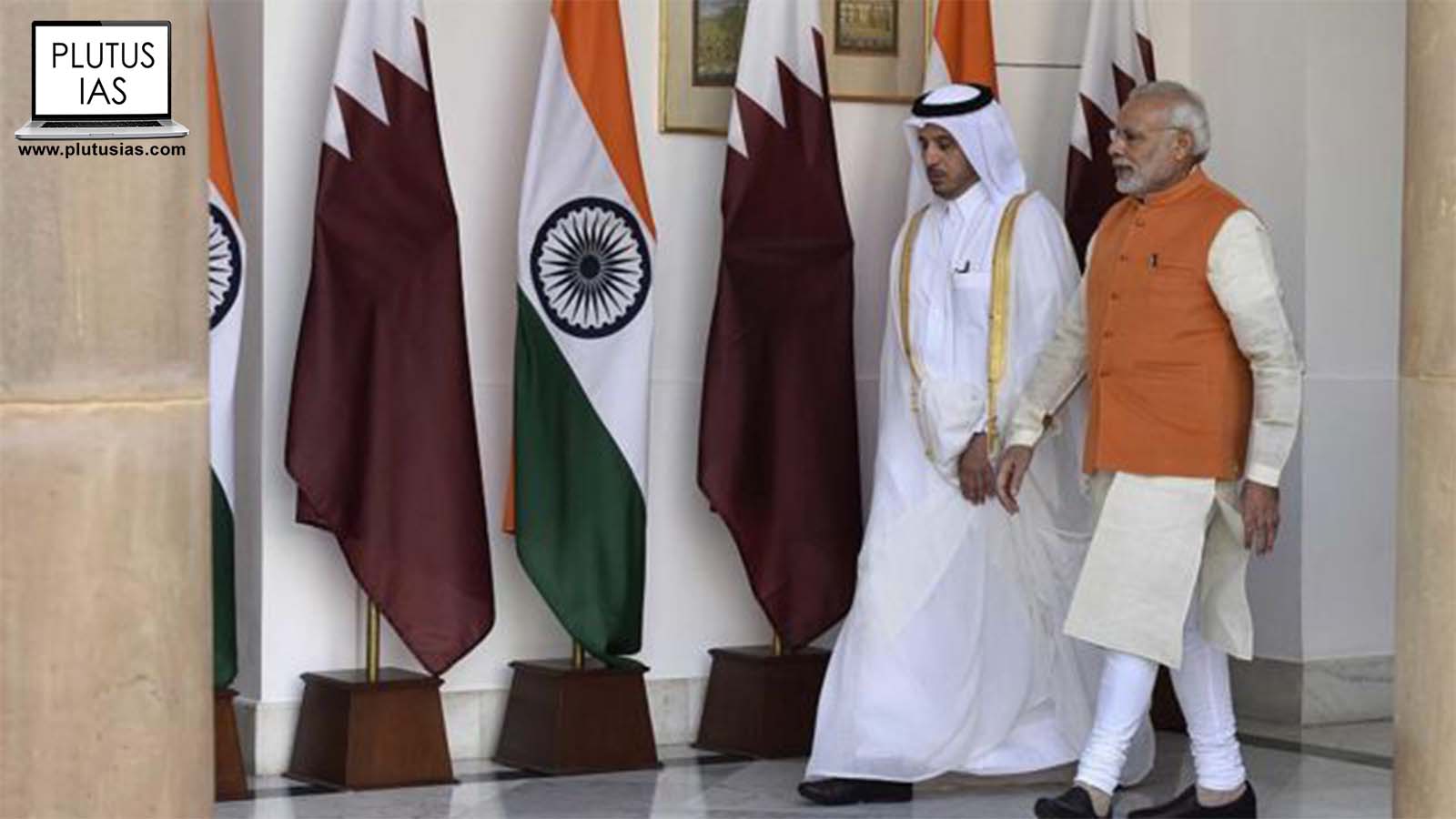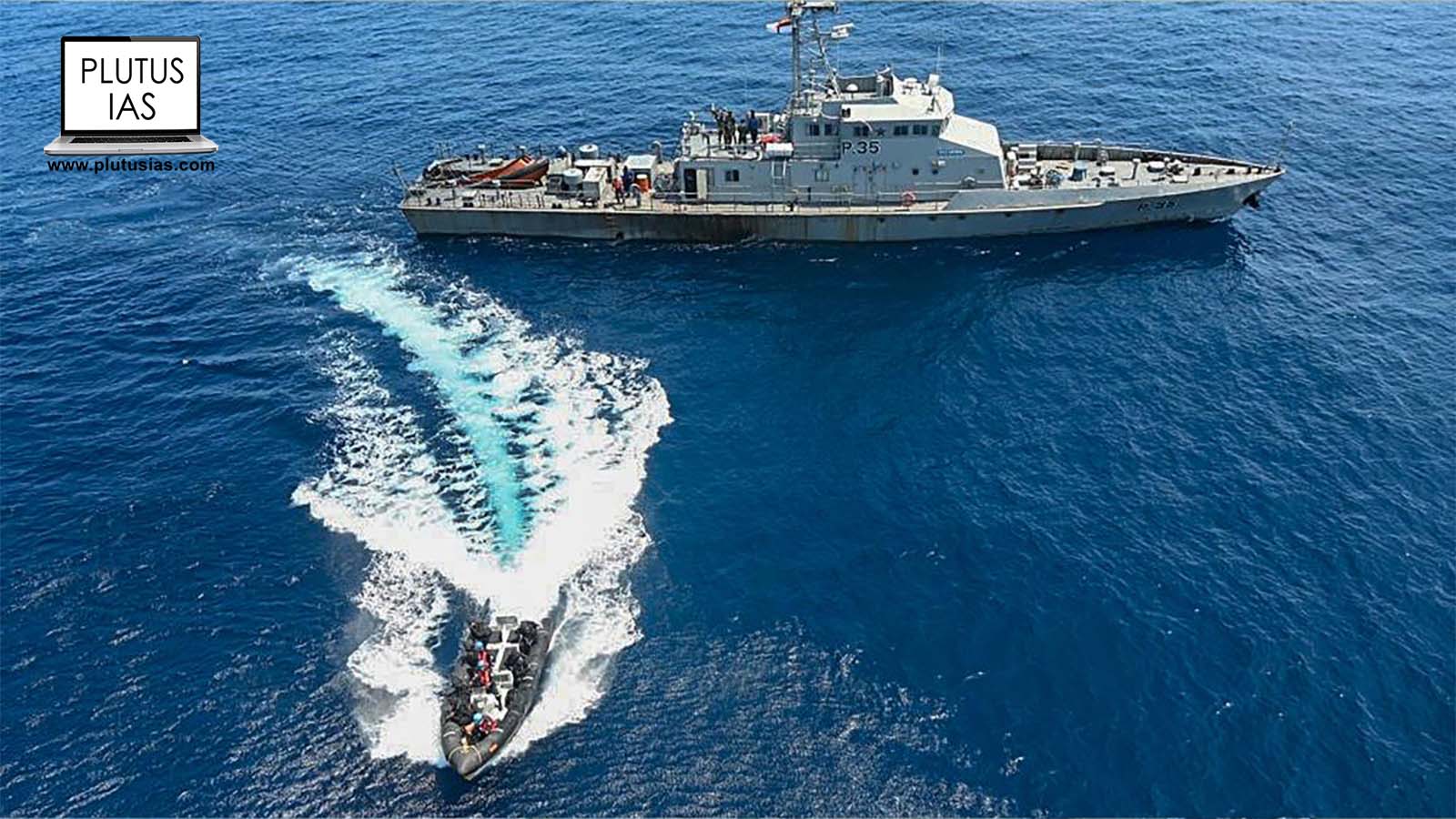29 Dec Qatar court puts interim stay on death sentence of eight Indians
(This article is from ‘Indian Express’, ‘The Hindu’, ‘Official website of the Ministry of Home Affairs, Government of India’, ‘Official website of the Ministry of External Affairs, Government of India’, ‘Jansatta’, monthly magazine ‘World Focus’ and ‘PIB’. The included editorial is related to a brief summary. It also includes the suggestions of the PLUTUS IAS team. This article is related to UPSC Civil Services Examination especially ‘International Relations, International Organization, Indian Polity and Governance, Indian Navy, India-Qatar Relations, International Court. (ICJ), United Nations (UN)’ section. This article is related to ‘Qatar court’s interim stay on death sentence of eight Indians’ under ‘Daily Current Affairs’.)
General Studies: International Relations, Indian Politics and Governance, Indian Navy, India-Qatar Relations, International Court of Justice (ICJ), United Nations (UN).
Why in discussion / News ?
In a major relief to 8 former Indian marines sentenced to death in Qatar, on 28 December 2023, on the appeal of the Government of India, an interim stay has been put on the death sentence of all eight people. India’s Ministry of External Affairs had approached the court in Qatar regarding this case, during the hearing of which the Qatari court reduced the death sentence.
Official sources of the Ministry of External Affairs of India have said that – “We (India) are waiting for the copy of the detailed decision.” Our legal team is in touch with the families of the eight Indians regarding next steps. During the hearing, India’s ambassador and officials based in Qatar were present in the court” .
India’s Ministry of External Affairs further said that – “We have stood with the families of the eight Indian people from the beginning. Considering the sensitivity of this matter, it would not be right for us to speak too much about it. We have been and will continue to raise this matter with the Qatari authorities.”
Who are these eight former Indian Navy personnel?
The eight former Indian Navy personnel have been identified as Captain Navtej Singh Gill, Captain Birendra Kumar Verma, Captain Saurabh Vashishtha, Commander Amit Nagpal, Commander Purnendu Tiwari, Commander Sugunakar Pakala, Commander Sanjeev Gupta and Sailor Ragesh Gopakumar.
What is the allegation against them?
Eight Indians working in Qatar-based Al Dahra Company (Qatar’s private security company) are accused of allegedly spying, for which recently a court in Qatar has issued a sentence to eight former officers of the Indian Navy. He has been sentenced to death on charges of espionage. The officials involved were arrested in August 2022 and charged with sharing confidential information.

Background of the present case:
Petition:
- The accused officers, who were working with Al Dahra (Qatar’s private security company) in Doha, were accused of allegedly sharing classified information at the time of their arrest in Qatar in the year 2022.
- The Qatar-based company ‘Dahra Global Technologies and Consultant Services’, for which the eight former Indian Navy officers worked, was also involved in the production of advanced submarines of Italian origin, which are also known for their stealth warfare capabilities.
- The main thing to note is that the charges against the eight Indian officials have not been made public by the Qatari authorities.
- Earlier investigation process regarding the present case:
- Presently, the investigation process regarding this matter has been completed twice in March and June of the year 2023 and more have also been done. While these accused detainees were granted consular access on several occasions, the authorities of both the Indian and Qatari countries maintained the confidentiality of the case citing the sensitivity of the matter.
Response given by the Government of India in the present case:
- The Government of India is exploring all possible legal options to secure the release of the eight accused former Indian Navy officers, while also expressing concern over the death penalty imposed by India on its citizens.
- The Ministry of External Affairs (MEA) has reiterated its commitment to provide consular and legal assistance to the eight Indian former naval officers detained in Qatar, and has also coordinated with all major authorities related to the case. Made aware of its importance.
Diplomatic implications:
- While the large Indian diaspora contributes to boosting economic and diplomatic ties, this decision could potentially strain relations between India and Qatar. More than seven lakh Indian expatriates reside in Qatar. This increases the pressure on the Government of India to take the highest level of action to save the lives of the prisoners lodged in the jails there.
- Those NRIs in Qatar are known and highly respected for their honesty, hard work, technical expertise and law-abiding nature as they contribute in different areas of employment in NRI Qatar. Are giving.
- Remittances from Qatar to India by the Indian expatriate community are estimated to be around $750 million per year.
- The current affair represents the first major crisis in India-Qatar relations, which have been generally stable until now.
- In the year 2016, along with the visit of the Indian Prime Minister to Doha, high-level meetings were also held between the two countries, after which meetings were also held between the two countries with the Emir of Qatar.
- An important supplier of liquefied natural gas (LNG) to India is Qatar, which supplies a major portion of India’s LNG imports.
The existing options available to India to stop the punishment of naval personnel are:
Diplomatic Option:
- In the present case, India can hold direct diplomatic talks with the Qatar government to find a solution to the matter. Given the strategic and economic importance of relations between the two countries, India’s diplomatic leverage can play an important role.
- The Indian government can also use diplomatic pressure to stop the death penalty.
- The idea is to use the agreement signed by India and Qatar in 2015 for the transfer of convicted prisoners so that they can serve their sentence in their home country. Such possibilities are also being considered by India.
- Filing an appeal against the decision by the Qatari court or NGOs and civil society can also raise this issue at the global level and pressure can also be put on Qatar by the United Nations.
Legal Options:
- According to Qatar’s judicial system, persons sentenced to death can file an appeal within the Qatari legal system. Therefore, India’s first step is to appeal within the judicial system in Qatar.
- India can ensure that detainees’ right to appeal is properly followed by providing them with legal representation.
- If proper procedures are not followed or the appeal process is disorganized, India can invoke International Court of Justice (ICJ) jurisdiction.
- The International Court of Justice (ICJ) acts as a world court with two types of jurisdiction. That is, it is also to give advisory opinions in case of legal disputes between two states submitted by them (controversial matters) and on legal questions referred to it by the organs and specialized agencies of the United Nations (consultative proceedings).

In which cases was India involved in the International Court of Justice (ICJ) jurisdiction till now?
- Kulbhushan Jadhav case (India vs Pakistan)
- Right of passage over Indian territory (Portugal vs. India, ended in 1960).
- Appeals relating to the jurisdiction of the ICAO Council (India v Pakistan, abolished in 1972).
- Pakistani Prisoners of War Trial (Pakistan vs. India, ended in 1973).
- Air incident of August 10, 1999 (Pakistan vs India, ended in 2000).
- Obligations related to preventing the nuclear arms race and negotiating nuclear disarmament (Marshall Islands v. India, ended in 2016).
Way to solve the problem/way forward:
- India needs to remain committed to the welfare and legal rights of its citizens while dealing with the complexities of international diplomacy and legal processes in Qatar. The way forward in this direction is likely to be challenging and may take time and require India to show determination.
- In this present case, as well as in the future, India may desperately need a combination of its diplomatic efforts, systematic legal actions and international cooperation for a successful and appropriate resolution of such problem/case. For which India needs to build very cordial and unbreakable diplomatic relations with other countries.
Download plutus ias current affairs eng med 29th Dec 2023
Practice Questions for Preliminary Exam:
Q.1. Consider the following statements with reference to the death sentences of eight former Indian sailors who have been granted interim stay by the Qatar court.
- The eight Indians working in Al Dahra Company based in Qatar are accused of allegedly spying.
- Consular access was also provided to these accused prisoners on several occasions.
- India can use International Court of Justice (ICJ) jurisdiction in this case.
- ‘Dahra Global Technologies and Consultant Services’ was also involved in the production of advanced submarines of Italian origin, which are also known for their stealth warfare capabilities.
Which of the above statement/statements is correct?
A. Only 1, 2 and 3
B. Only2, 3 and
C. All of these.
D. None of these.
Answer – C
Practice Questions for Main Exam:
Q.1.In the context of the interim stay on death sentence of Indian former naval personnel in Qatar, discuss the legal options before India and its impact on India-Qatar relations.




No Comments